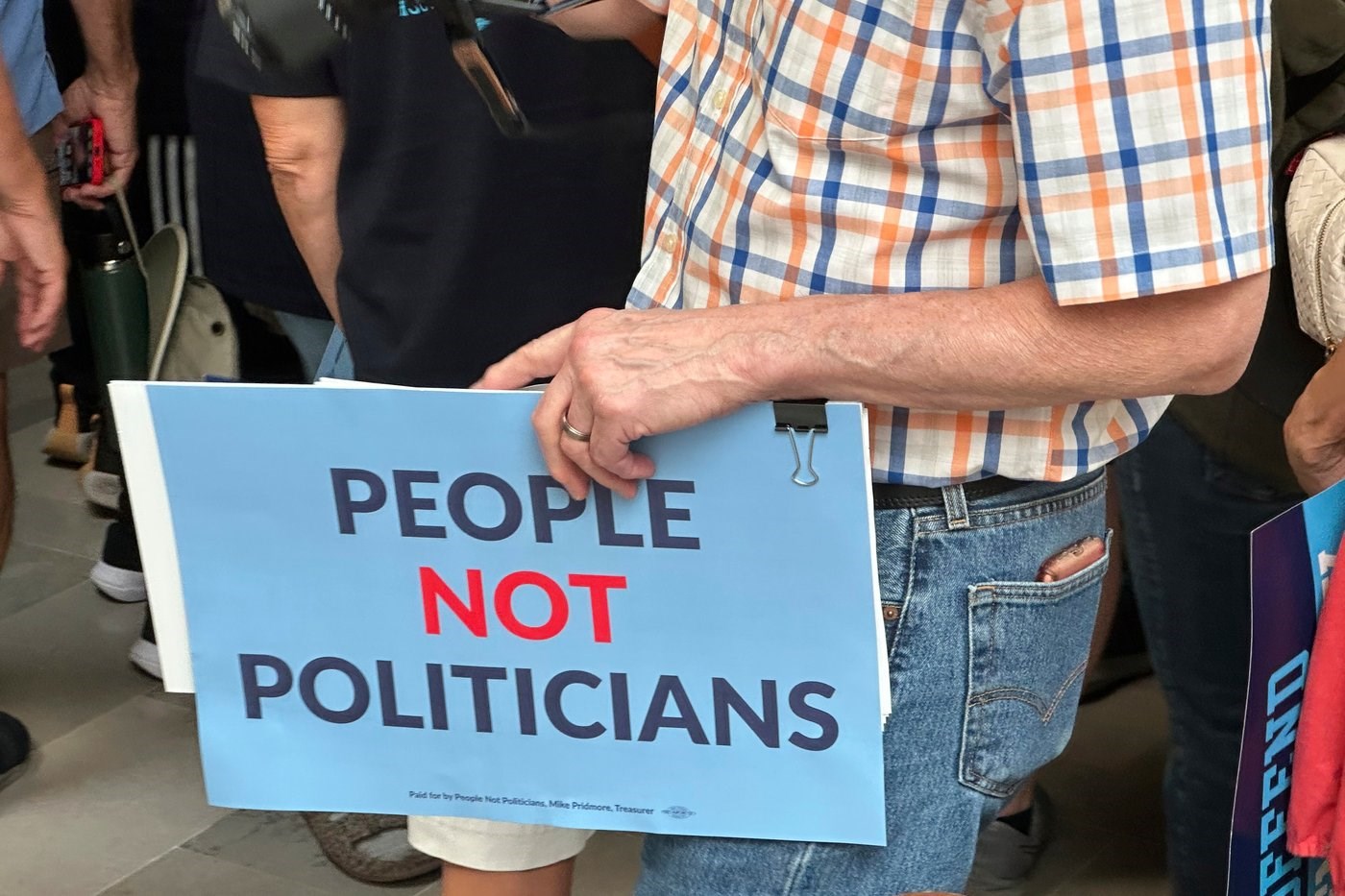David A. Lieb

A protestor holds a sign in opposition to a plan redrawing Missouri's U.S. House districts during a rally at the state Capitol, Friday, Sept. 12, 2025, in Jefferson City, Mo. (AP Photo/David A. Lieb)
Republished September 12, 2025 - 2:11 PM
Original Publication Date September 12, 2025 - 11:46 AM
JEFFERSON CITY, Mo. (AP) — Missouri Republicans handed President Donald Trump a political victory Friday, giving final legislative approval to a redistricting plan that could help Republicans win an additional U.S. House seat in next year’s elections.
The Senate vote sends the redistricting plan to Republican Gov. Mike Kehoe, who said he will sign it into law soon. But opponents immediately announced a referendum petition that, if successful, could force a statewide vote on the new map.
“This fight is not over. Missouri voters — not politicians — will have the final say,” said Elsa Rainey, a spokesperson for People Not Politicians, which is leading the referendum effort.
U.S. House districts were redrawn across the country after the 2020 census to account for population changes. But Missouri is the third state to take up mid-decade redistricting this year in an emerging national battle for partisan advantage ahead of the midterm elections.
Republican lawmakers in Texas passed a new U.S. House map last month aimed at helping their party win five additional seats. Democratic lawmakers in California countered with their own redistricting plan aimed at winning five more seats, but it still needs voter approval. Other states could follow with their own redistricting.
Each seat could be critical, because Democrats need to gain just three seats to win control of the House, which would allow them to obstruct Trump’s agenda and launch investigations into him. Trump is trying to stave off a historic trend in which the president’s party typically loses seats in midterm elections.
On his social media site Friday, Trump touted Missouri's “much fairer, and much improved, Congressional map” that he said “will help send an additional MAGA Republican to Congress in the 2026 Midterm Elections.”
Missouri Republicans are targeting a Kansas City district
Republicans currently hold six of Missouri’s eight U.S. House seats. The revised map passed the Republican-led state House earlier this week as the focal point of a special session called by Kehoe that also includes a proposal making it harder for citizen-initiated constitutional amendments to win voter approval. That proposal, which still needs voter ratification, would require future initiated amendments to pass in each of Missouri's congressional districts instead of by a simple statewide majority. No other state has such a standard.
The Republican-led Senate passed both measures Friday after changing the chamber’s rules, then shutting off Democratic opponents. Senate Minority Leader Doug Beck said afterward that he plans to help gather the more than 100,000 signatures needed in 90 days to force a referendum on the redistricting plan.
Kehoe has promoted the reshaped districts as a way to amplify “Missouri’s conservative, common-sense values” in Washington, D.C.
Missouri’s revised map targets a seat held by Democratic U.S. Rep. Emanuel Cleaver by shaving off portions of his Kansas City district and stretching the rest of it into Republican-heavy rural areas. The plan reduces the number of Black and minority residents in Cleaver’s district, partly by creating a dividing line along a street that has served as a historical segregation line between Black and white residents.
Cleaver, who was Kansas City’s first Black mayor, has served in Congress for over 20 years. He won reelection with over 60% of the vote in both 2024 and 2022 under districts adopted by the Republican-led state Legislature after the 2020 census. He said he plans to challenge the map in court and seek reelection in 2026, regardless of the shape of his district.
"Together, in the courts and in the streets, we will continue pushing to ensure the law is upheld, justice prevails, and this unconstitutional gerrymander is defeated,” Cleaver said in a statement Friday.
Kansas City residents raise concerns about new districts
Cleaver's revised Kansas City district would stretch from near the city’s St. James United Methodist Church — which Cleaver once led — 180 miles (290 kilometers) southeast to include another United Methodist church in rural Vienna. In the neighborhood around Cleaver’s hometown church, where his son is now pastor, about 60% of the residents are Black or a mix of Black and another race, according to U.S. Census Bureau data. By contrast, the area around Vienna has just 11 Black residents out of nearly 2,500 people.
Democratic state Sen. Barbara Washington of Kansas City, who described Cleaver as her longtime pastor, said the new map “erases the voice of my community.”
“Carving up Kansas City and silencing our constituents is terrible,” Washington said.
Kansas City resident Roger C. Williams Jr., a 79-year-old former middle-school principal, said the effort to reshape congressional districts reminds him of the discrimination he witnessed against Black residents while growing up in Arkansas.
“What Republicans are doing now in the state of Missouri is they’re taking me back to a time when I, or people that looked like me, would not have an opportunity, because they wouldn’t have a voice,” he said.
Republican lawmakers said little during Senate debate. But sponsoring state Rep. Dirk Deaton, a Republican, has said the new congressional map splits fewer overall counties and municipalities into multiple districts than the current one.
Republican Senate President Pro Tem Cindy O'Laughlin said in a statement after the Senate vote that the map "strengthens Missouri’s conservative voice and ensures every Missourian is fairly represented in Washington.”
___
Associated Press writers Heather Hollingsworth in Kansas City, Missouri, and John Hanna in Topeka, Kansas, contributed to this report.
News from © The Associated Press, 2025